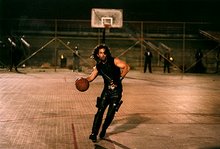
I thought I was done with the Team USA recaps until the championship game, but watching the Argentina game tonight pulled me back in. Yes, the margin (91-76) was closer than it has been, but this team is so much fun that I can’t stop watching and enjoying them. I’ve seen every minute of Team USA’s games in this tournament and wouldn’t have it any other way. At the risk of sounding too much like Bill Walton, an overpowering positive life force pervades everything they do on the court. As such, this recap won’t focus entirely on the strategic intricacies of the game; honestly, I just want to talk about some of my favorite things from the night. Hopefully some of you will have some to add, as well.
After LeBron’s perfect game against Uruguay, I assumed Kobe, arguably the proudest player in the league, would try his best to take back some of the spotlight. For the first few minutes, he did exactly that, scoring 15 in the first quarter. The best part of his early performance, though, was that he didn’t seem to be doing it primarily out of anger, although I’m sure there was some of that. It all came naturally. Kobe genuinely seems to love playing on this team, and it shows in most everything he does on the court. This is the highpoint of his post-Shaq career, and he knows it. Let’s remember to think about the good times when he submarines the Lakers in training camp.
LeBron was obviously phenomenal last night, but one play from tonight stood out to me almost as much as anything he did versus Uruguay. In the middle of the 3rd, LeBron thundered through the lane and scored a basket, only to be called for a highly questionable charge. On the next USA possession, LeBron picked up a loose ball, instantly barreled through a few Argentineans, checked an off-balance Luis Scola in the hip hard (he took his time getting up), and scored for an and-one. It was a truly great play, and, along with his improved shooting, evidence that LBJ might be growing up some. Of course, let’s see what I think about that after he hosts SNL in a few weeks.

Scola played limited minutes due to early foul trouble and the blowout, but I saw enough to know the Spurs made a mistake in trading him to a divisional rival. I watched a bit of Scola earlier in the tournament, although that didn’t quite prepare me for how well he matched up against the legitimate NBA post defenders on Team USA. The Rockets have to be thrilled; he should be a great fit opposite Yao. The high/low could be a really effective weapon for them, although those guys are talented enough to make just about anything work. Trading Scola wasn’t the worst idea for the Spurs simply because they don’t need him, but why trade him to a team in the West that needed just a few more pieces to be really dangerous? Big up yourself, Daryl Morey.

The 4th quarter featured perhaps my favorite moment from the entire tournament: Kidd’s attempted backboard pass to LeBron ... on the run ... from the right wing. It was an absolutely perfect pass; if LBJ had caught it cleanly and thrown it down, we’d be watching it for the next half-century. No one but Kidd could make that play half-work, and the fact that even tried it explains exactly why I’ve loved watching these games. They’ve been better than any All-Star Game I’ve seen.
And now, some extremely important off-the-court news. Las Vegas Review-Journal writer Jeremy Pond (who wears an eye patch!) has reported (towards the bottom of that page) that Amare and LeBron partied with UFC superstar Chuck Liddell, Ron Jeremy, and master illusionist Criss Angel last Saturday (via AZ SportsHub). I could really care less about Liddell, and Jeremy is pretty much established as a hanger-on at this point, but Criss Angel was partying with two of the best players in the NBA. I don’t know how many of you watch Mindfreak—it is truly the most ridiculous show ever—but this surprised me even more than the time he teleported into an armored truck. Who let him hang out with that group? Did he hypnotize them or something?

Shockingly, it gets even better. Angel’s chief rival, David Blaine, has also been hanging around the team, although Captain Jeremy Pond’s notes make it seem like no one’s let him in on the inner circle fun. I’ve been trying to wrap my head around this whole situation for the last hour or two, and all I can picture is Angel pulling quarters out of Amare’s ear band-aid while Blaine sulks in the corner. My mind is officially blown.
Random notes: Someone with more internet talent than myself really needs to put that Kidd pass on YouTube. If you do it, I’ll be in your debt forever. … I could really care less about Ginobili, Oberto, and Hermann being out for this tournament, but I’m very upset about not having Pepe Sanchez around. It’s been too long since I’ve seen one of my favorite college point guards of all-time. … Argentina’s jerseys—particularly the road ones—are so bad that even Oregon would reject them.


































